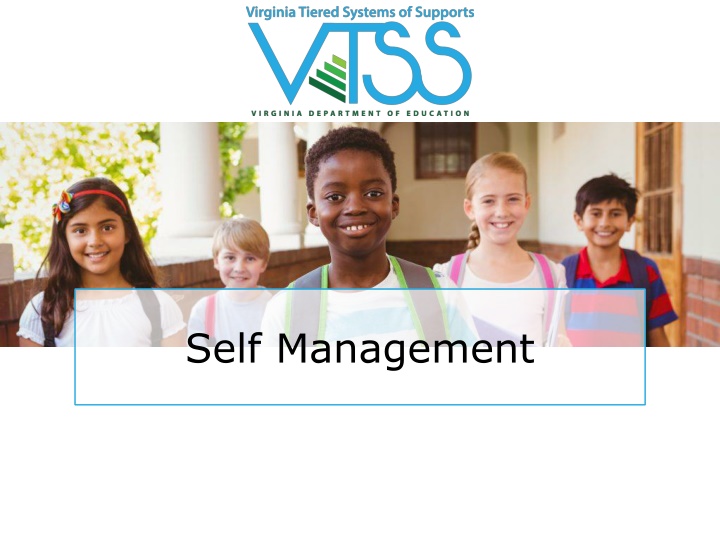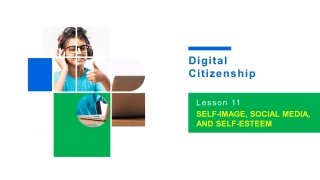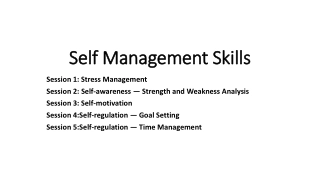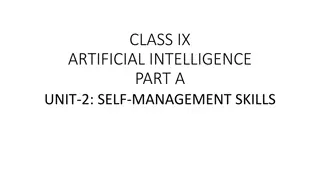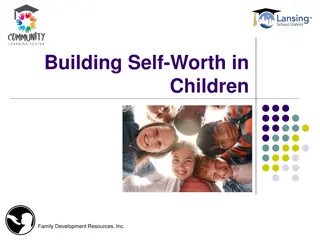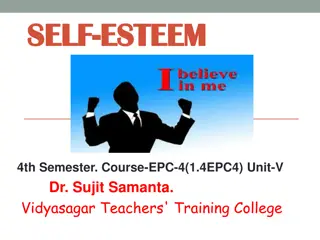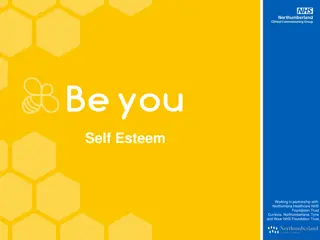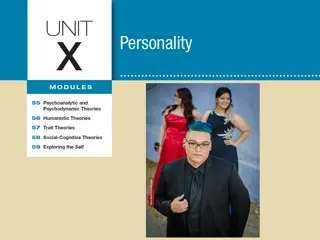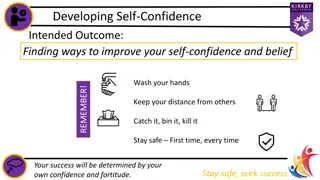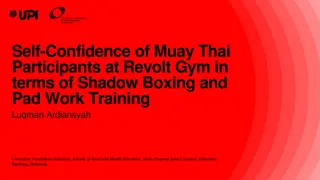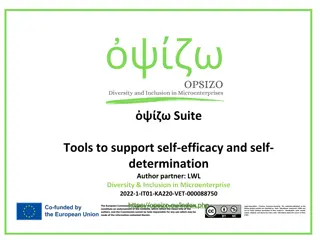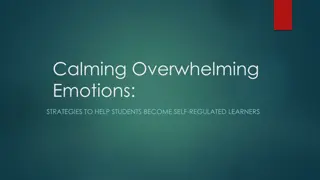Developing Self-Management Skills
Self-Management involves the ability to regulate emotions, thoughts, and actions effectively in various situations. Explore strategies and techniques to support students in enhancing their self-management skills for better outcomes in academics and life. Understand the importance of self-management in childhood and its impact on future success.
Uploaded on Apr 04, 2025 | 1 Views
Download Presentation

Please find below an Image/Link to download the presentation.
The content on the website is provided AS IS for your information and personal use only. It may not be sold, licensed, or shared on other websites without obtaining consent from the author.If you encounter any issues during the download, it is possible that the publisher has removed the file from their server.
You are allowed to download the files provided on this website for personal or commercial use, subject to the condition that they are used lawfully. All files are the property of their respective owners.
The content on the website is provided AS IS for your information and personal use only. It may not be sold, licensed, or shared on other websites without obtaining consent from the author.
E N D
Presentation Transcript
What We Will Know and Do Build an understanding of self-management Leave with some strategies or techniques that you could try in the classroom to support your students in developing self-management skills
Self-Management Self-Management is the ability to manage your emotions, thoughts, and behaviors in different situations.
What Does this Look Like? Managing your emotions Delaying gratification Motivating yourself Focusing attention Setting and working towards goals
Why This Matters Higher self-management in young children is correlated with positive outcomes such as high school completion and higher income levels later in life. Lower self-management is correlated with chronic health problems, financial difficulties, substance abuse, and criminal involvement.
Video Example Inspirational Video- Be a Mr. Jensen- MUST WATCH!! When we help team members, students, and co-workers to become more of who they already are retention improves, sales increase, academic success soars and your people win...Be a Mr. Jensen!" Known as The Millennial Speaker , Clint Pulver helps organizations that want to retain, engage and inspire their younger workforce. As the President and founder of The Center for Employee Retention, Clint has transformed how corporations like Keller Williams, ATT and Hewlett Packard create lasting loyalty through his work and research as The Undercover Millennial . He has appeared on America s Got Talent and in several different Feature Films with actors like Jack Black (School of Rock) and John Heder (Napoleon Dynamite). Clint was named one of Business Q Magazine s Top 40 Under 40 for his work in helping corporations elevate their WHY of mentorship in the workplace and how connected and engaged employees yield loyal and long-term retention within organizations. For over a decade, Clint has helped leadership teams diminish turnover, increase engagement and create an organization their people never want to leave. With a blend of humor, unforgettable stories, and actionable takeaways that stick, Clint convinces audiences on the power of The Mentorship Effect, and why some leaders create lasting loyalty and others don t. To bring Clint to your event visit https://clintpulver.com Thank you for subscribing!! http://clintpulver.com
Discussion What resonated with you in the video? What strategies have worked with your students in helping them build self- management skills?
Strategies to Promote Self- Management Skills
Self-Management Strategies The most effective strategies are proactive. They involve action long before the distraction or decision point occurs. They can be practiced repeatedly long before they are needed.
Create Self-Management Expectations Provide opportunities for students to track their own progress towards goals over time. 1. Readiness to Learn: Create a checklist and set aside time at the beginning of class for students to assess their readiness to learn. Track their results so students can see their progress over time 1. Classroom Behavior: Have students track classroom expectations. At the end of each class, have students rate themselves and record their results.
Cognitive Strategies The Marshmallow Test | Igniter Media | Church Video Download this church video free w/ a 30-day trial: http://bit.ly/2DsfFoE. In this popular test, several kids wrestle with waiting to eat a marshmallow in hopes of a bigger prize. This video is a good illustration of temptation and the hope in future rewards. This experiment is based on many previous and similar scientific tests. Special thanks to Watermark Community Church (http://www.Watermark.org) for sharing their video with us. ------------------------------------------------------------------------------------------------ Thanks for checking out the Igniter YouTube Channel! If you re reading this, chances are, you may be a church leader with more than enough on your plate with too much stress and too little time looking for creative resources to help. You ve come to the right place. ------------------------------------------------------------------------------------------------ LET'S CONNECT! Instagram https://www.instagram.com/ignitermedia Twitter https://twitter.com/ignitermedia Facebook https://www.facebook.com/ignitermedia
Discussion #2 What strategies did some of the kids use to resist temptation or increase their focus on the goal of getting 2 marshmallows?
The WOOP Method The WOOP Method The WOOP strategy, which is positive thinking plus a dose of reality, contains four steps: Wish: Students name an important but feasible wish or goal that they want to fulfill. Outcome: Students imagine, as vividly as possible, what the future will be like once they fulfill this wish or reach the goal. Obstacle: Students imagine the most critical personal obstacle that stands in the way of fulfilling that wish or reaching the goal. Plan: Students name an effective behavior to overcome the obstacle and create a specific plan using an if-then statement: If X happens, then I will Y.
Practice Instructions: Identify one of the strategies we have discussed (or one of your own ideas) that you would like to try. Pick something that will take relatively little effort to implement. Think about particular students you would like to use the strategy with Why did you pick the strategy you did? How would you put it in place or get started? How would you practice it? Or how would your students practice it? What will your immediate next steps be?
Team Talk: Review the How How will you adjust your practices to support learning for students who have experienced trauma? How will you involve families and students in practices? Fill this in on your Action Plan under Objectives and Action Planning
References/Resources Moffitt, T. E., Arseneault, L., Belsky, D., Dickson, N., Hancox, R. J., Harrington, H., Houtes, R., Poulton, R., Roberts, B., Ross, S., Sears, M., Thomson, W.M., & Caspi, A. (2011). A gradient of childhood self-control predicts health, wealth, and public safety. Proceedings of the National Academy of Sciences, 108(7), 2693-2698.) Knudsen, E. I., Heckman, J. J., Cameron, J. L., & Shonkoff, J. P. (2006). Economic, neurobiological, and behavioral perspectives on building America s future workforce. Proceedings of the National Academy of Sciences, 103(27), 10155-10162 McClelland, M., A. Piccinin, Acock, A. & Stallings, M. (2011) Relations between preschool attention and later school achievement and educational outcomes. doi: 10.1016/j.ecresq.2012.07.008
References/Resources Mischel, W., Shoda, Y., & Rodriguez, M. L. (1989). Delay of gratification in children. Science, 244, 933- 938; Y. Shoda, W. Mischel, & P.K. Peake (1990). Predicting adolescent cognitive and self regulatory competencies from preschool delay of gratification. Developmental psychology, 26(6), 978 86 https://www.psychbytes.com/woop-goal-setting/ https://www.transformingeducation.org/wp- content/uploads/2019/04/Introduction_to_Self- Management_Handout_Final_CC.pdf
References/Resources https://youtu.be/4p5286T_kn0 https://youtu.be/QX_oy9614HQ
